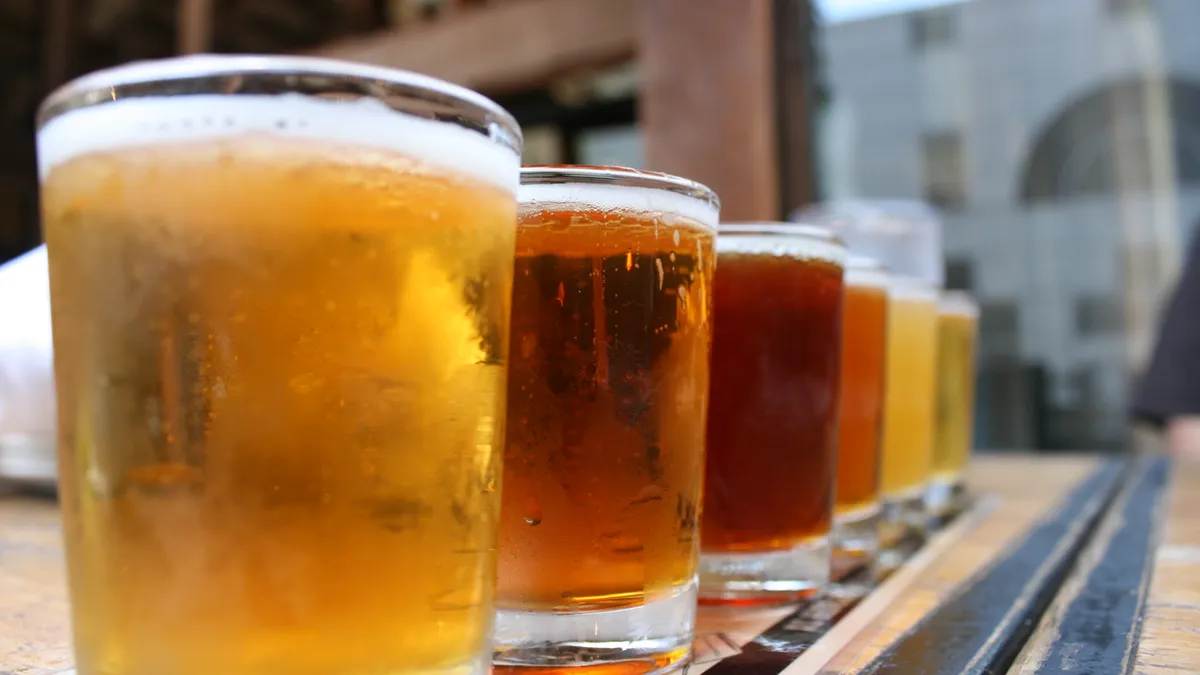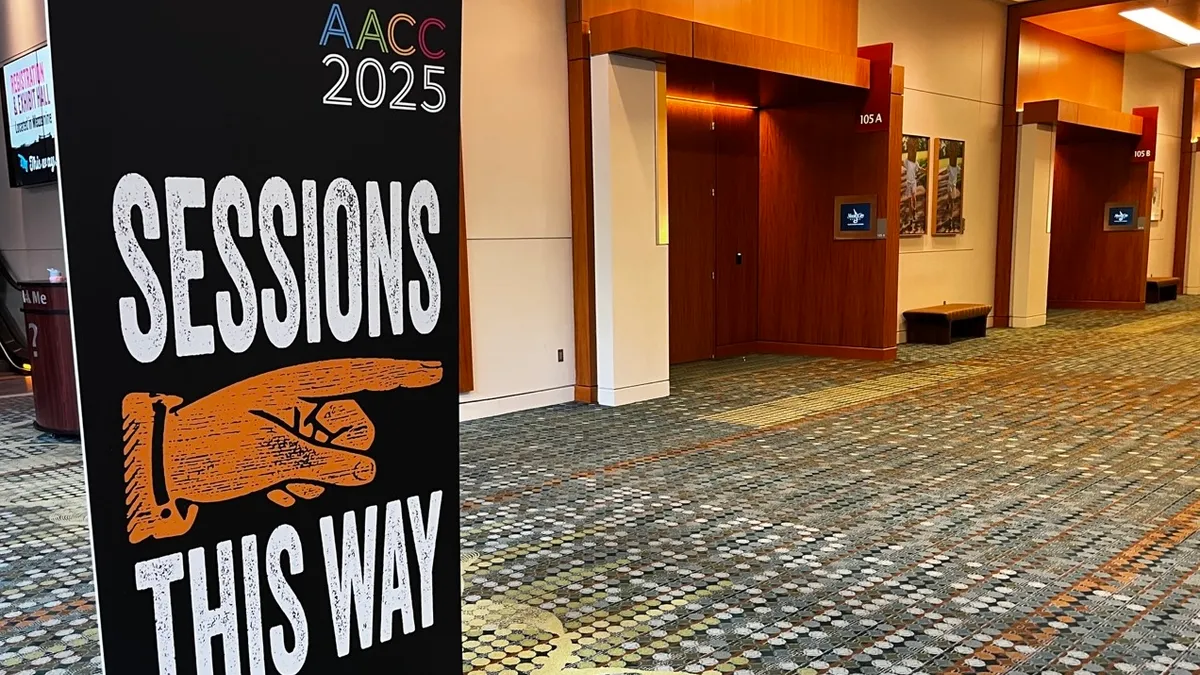Editor's note: This article is part of a new series on how colleges and universities are developing curriculum around the needs of their states' workforce. Let us know what your college is doing.
Traveling around Pennsylvania to map its craft breweries, Alison Feeney realized the state was light on something. For all the beer it makes, it has few places to get a formal education in it.
Feeney, a geography professor at Shippensburg University who was working with the state to gauge the size of the growing industry, spent time talking with the brewers about how they learned their craft.
"They kept saying, 'You know, I don’t know how to this,' or, 'I'm trying to figure out how to do that,'" she said. "I would keep bringing that information back to other people on campus."
They're common questions among people working in the nation's growing craft beer industry. The skills they need are two-fold: how to make beer, and how to sell it.
Several states with strong beer industry ties and their higher education institutions — like Pennsylvania and Shippensburg — have identified the need to enrich and expand the skilled beer workforce. In response, they are developing educational pathways ranging from short-courses for professionals to full-on bachelor's degrees.
In Pennsylvania's case, craft beer is in its DNA. It ranked first among U.S. states in production in 2017, with the industry's economic impact of $5.8 billion second only to California's ($7.3 billion), according to data from the Brewers Association. That year it was home to 282 craft breweries, up from 88 in 2011.
While Pennsylvania's craft beer industry has gained national attention with the rise of homegrown brands like Yuengling and Tröegs, it dates to the arrival of the beer-making (and drinking) Germans, Welsh and Scots, Feeney said. More recently, the loosening of rules around who can make and sell beer, along with plenty of vacant industrial buildings with space to brew, is helping the state carry on its craft tradition.
That's important at a time when Americans are developing a taste for craft beer. While overall beer sales fell 1.2% by volume in 2017, craft beer sales rose 5%, according to the Brewers Association. Other reports show consumers are more willing to try different craft beers, while brewer-owned taprooms are proving to be a draw.
Julia Herz, craft beer program director at the Brewers Association, counts about 135,000 full- and part-time jobs across the more than 7,000 craft breweries in operation, including serving, working in tasting rooms and brewing. Just under 1,000 craft breweries opened last year and 3,000 more have taken formal steps to open in the future, she said, though the market is tightening and some big brewers have laid off staff in recent months.
Shippensburg, a public university, already teaches many of the skills needed for brewing in its chemistry, physics and engineering courses. But Feeney's conversations with brewers indicated a need for more training among Pennsylvanians who already worked in the beer industry. So she started inviting brewers — large and small, new and mature — to campus to help figure out what classes tailored to the needs of the profession could look like.
"We just have this open discussion of what sort of things do they struggle with," she said. "Skilled workforce by far is the main thing that they have to worry about."
Late last year, Shippensburg got a $71,701 grant to make those classes a reality. It's part of a roughly $791,000 effort by the Pennsylvania Liquor Control Board to help the state make more malt and brewed beverages and better promote the industry. Shippensburg's award calls for "[e]ducational short courses, professional training and laboratory work" as well as "apprenticeship-type experiences" to train new and existing workers.
Feeney expects the offerings will vary. "Their (participants') range of needs is just huge because everybody has gotten to this point through a variety of background experiences," she said.
Raising the bar for brewers
Christian Lampe, co-owner at Weyerbacher Brewing and one of the brewers helping inform the Shippensburg classes, learned how to make beer the old fashioned way.
"I learned on the floor," said Lampe, who is also president of the Brewers of Pennsylvania. "You make a lot of bad beer when you do it that way. You've got to throw a lot of stuff out."
An increase in formal training opportunities across the country, however, is raising the bar for aspiring brewers. Some of the most popular beer education programs can be found at the University of California, Davis, San Diego State University, Colorado State University and Metropolitan State University of Denver. Perhaps the most prestigious is the Siebel Institute of Technology, an unaccredited program in Chicago that is more than a century old and includes opportunities to study the craft in Germany. Brewers can also learn through the Brewing and Fermentation Science program at the Pennsylvania College of Technology.
"The level of education for brewing and the business of beer has certainly caught up with the whole movement of craft brewing," Herz said.
Yet while many of today's brewers learned at home, she said, they tend to hire out of formal education programs or other breweries.
Scott Kerkmans, director of the beer industry program at Metropolitan State University of Denver, said he has noticed a "much more formal emphasis" from companies and colleges on educating brewers and newcomers. The industry, he said, had "tapped all the hiring and staffing resources they could in their particular communities" and needed a way to grow the workforce.
Community colleges and public universities have sprung to fill that gap.
Metro State is one of them. Its program is about three years old and includes two bachelor's degrees — one focused on the science of brewing and the other on managing a brewing business — as well as a minor and a certificate in brewery operations. Of the 125 students it serves, about three-quarters are on the bachelor's track.
Shippensburg is still developing its program, but Feeney said the brewers have shown interest in topics such as quality control, developing a palate for beer, and marketing and managing a beer business.
"It's not hard to create somebody who can brew beer. What's hard is creating somebody who knows how beer is made who can also lead a brewery into the next generation."

Scott Kerkmans
Beer industry program director, Metropolitan State University of Denver
What brewers need to know depends on where they work. Those hoping to work for large producers need specialized knowledge in areas like thermodynamics, cleaning and sanitizing equipment, computer engineering and the chemistry of fermentation.
Smaller brewers, on the other hand, need to be "a jack of all trades," Lampe said. In addition to knowing how to brew beer, they must understand how to source raw materials and supplies, comply with health and safety rules, market their product and navigate distribution channels to get it into customers' hands.
The latter part is critical for craft brewers, Herz said. Large producers like Anheuser-Busch InBev and MillerCoors control the supply chain. Now they too are tapping customer demand for craft beer by buying up independent breweries. That makes getting on the shelves of the local grocery store or on tap at area restaurants even more challenging for small brewers.
Experience matters
Beer education is shifting to the classroom, but experiential learning is still an important part of the programs. Feeney expects Shippensburg will follow the example of other brewing programs with shadowing experiences for students who don't already work in beer and tie-ins to their day jobs for those who do.
That's where the relationships Shippensburg is building with the state's brewers will be important. Feeney hopes the courses will be co-taught with a brewer and a university instructor. "We can do a lot of the organization here (at the university) but we really want that practical experience coming from the industry," she said.
At Metro State, Kerkmans realized having students test only their own beer in the university's $2.7 million alcoholic beverages lab was "limiting." So in January, the university launched a partnership with brewing companies to test their product. Working with a professional lab manager, students run quality checks, which also gives them a better idea of what commercial producers expect.
"One of the ways we can justify putting so many resources toward something like this entire program is that we then are able to create some public-private partnerships with industry to test beer at a very competitive rate while students are still learning and make some money back for the program," he said.
Ryan Richards, co-founder of Roy Pitz Brewing Company, a small brewery roughly 10 miles from Shippensburg, said he hosts students as volunteers and for credit-bearing shadow programs.
Like Weyerbacher's Lampe, he sees on-ramps to the brewing industry changing as more formal education opportunities become available. He and his co-founder, Jesse Rotz, got their beer education at the Siebel Institute. Even there, he said, they had to have some experience in order to get the references required to apply.
Opportunities for getting experience vary across higher ed and private-sector programs. Shippensburg is starting with short-courses, which it hopes to offer by the fall. An undergraduate degree program is possible eventually, though that's not the goal of the grant, Feeney said. The institution also is offering seminars and tours to nonprofessional brewing enthusiasts.
Kerkman said bachelor's degrees may become more common as the beer education market expands. And short-term professional development courses will continue to be a draw for people already working in the industry, he added.
"It's not hard to create somebody who can brew beer," he said. "What's hard is creating somebody who knows how beer is made who can also lead a brewery into the next generation."
Correction: A previous version of this article misstated the economic impact of Pennsylvania's and California's craft beer industries. They are $5.8 and $7.3 billion (not million) respectively.





















